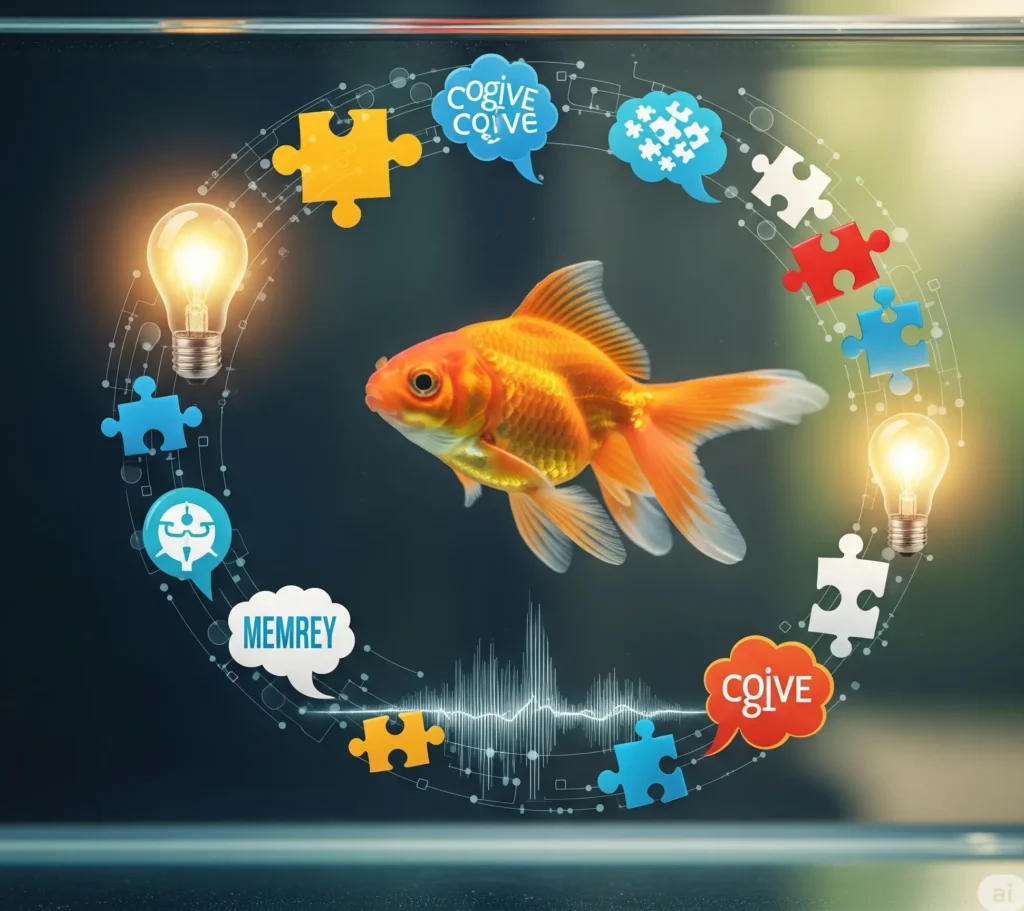Unraveling the Myth of the “Goldfish Memory”
The phrase “goldfish memory” is commonly used to describe someone with a poor memory, implying that these aquatic creatures possess an exceptionally short recall. However, this widely held belief is largely a myth, debunked by scientific research and observation. Far from having a memory lasting only a few seconds, goldfish have demonstrated surprising cognitive abilities, including the capacity for learning, retention, and even problem-solving. This article will delve into the scientific evidence that refutes the “goldfish memory” stereotype, explore the fascinating cognitive capabilities of these seemingly simple creatures, and discuss how our understanding of animal intelligence continues to evolve.
The Origins of a Misconception
The exact origin of the “goldfish memory” myth is unclear, but it has permeated popular culture for decades. Perhaps it stems from the repetitive nature of their swimming in tanks or the perception that their small brains limit their cognitive potential. Whatever its genesis, the idea of a goldfish having a memory of mere seconds has become deeply ingrained, often used humorously or to dismiss the intelligence of other animals. This misconception has unfortunately overshadowed the genuine capabilities of goldfish, leading to an underestimation of their complex behaviors and learning capacities. It’s a classic example of how a simple, catchy phrase can become a pervasive “fact” without substantial evidence.
Scientific Studies That Debunk the Myth
Numerous scientific studies have challenged and definitively disproven the notion of a fleeting goldfish memory. One of the earliest and most impactful experiments involved associative learning, where goldfish were trained to associate a specific action with a reward. For example, researchers at the University of Plymouth in the UK trained goldfish to push a lever to receive food. Not only did the goldfish learn this task, but they also remembered it for at least three months. When the lever was only active for an hour a day, the fish learned to approach the lever only during that specific hour, demonstrating a sense of time and advanced memory retention.
Further studies have explored classical conditioning in goldfish. In one such experiment, a specific sound or light was paired with feeding time. After repeated pairings, the fish would respond to the sound or light even in the absence of food, indicating they had formed a strong association. Crucially, these learned behaviors were retained over significant periods, sometimes weeks or even months, far exceeding the purported “three-second” memory.
Another compelling area of research involves spatial memory. Scientists have observed goldfish navigating complex mazes and remembering the routes to reach food or escape a perceived threat. These experiments highlight their ability to create and recall mental maps of their environment, a sophisticated cognitive function that requires robust spatial memory. For instance, researchers have shown that goldfish can distinguish between different shapes, colors, and even musical genres, remembering these distinctions for extended periods. This level of discernment suggests a far more developed cognitive apparatus than previously assumed.
The capacity for discrimination has also been a focus of research. Goldfish have been trained to differentiate between different musical composers, such as Bach and Stravinsky. When presented with music from one composer, they would receive a reward, and when presented with music from the other, they would not. The fish successfully learned to distinguish between the two and responded accordingly, showcasing their ability to remember complex auditory patterns. These findings collectively paint a picture of an animal with significant memory capabilities, challenging the long-held popular belief. For more on animal cognition, consider exploring resources from institutions like the University of Oxford’s Department of Zoology.
Goldfish: More Than Just Simple Swimmers
Beyond memory, goldfish exhibit a range of other fascinating cognitive abilities. They can recognize individual humans, particularly those who regularly feed them. Anecdotal evidence from fish owners often supports this, as fish may react differently to familiar faces compared to strangers approaching their tank. This suggests a capacity for individual recognition, a trait often associated with more complex social animals.
Goldfish also display observational learning, meaning they can learn by watching other fish. If one goldfish is trained to perform a task, another goldfish observing the trained fish can often learn the same task more quickly than a fish that has not observed the behavior. This form of learning is a cornerstone of social intelligence and points to a sophisticated level of cognitive processing.
Their ability to adapt to new environments further underscores their intelligence. When moved to a new tank or environment, goldfish quickly explore and learn the layout, remembering hiding spots, feeding locations, and potential threats. This rapid adaptation is a testament to their learning and memory skills. The complex interplay of their senses, particularly their vision and lateral line system, allows them to perceive and remember their surroundings with remarkable detail. Understanding how animals adapt to new environments can be further explored through articles on animal behavior research.
The Importance of Rethinking Animal Intelligence
The debunking of the “goldfish memory” myth is part of a larger, ongoing shift in our understanding of animal intelligence. For a long time, human beings were considered the sole possessors of advanced cognitive abilities, with other species viewed as mere instinct-driven creatures. However, mounting scientific evidence, from research on dolphins and elephants to crows and even insects, reveals a spectrum of intelligence across the animal kingdom. Animals exhibit problem-solving skills, emotional depth, communication abilities, and various forms of memory that challenge anthropocentric views.
This evolving understanding has significant implications for how we treat animals, both in captivity and in the wild. Recognizing their cognitive capacities can lead to more ethical considerations in pet ownership, animal welfare, and conservation efforts. It encourages us to appreciate the rich inner lives of diverse species and fosters a greater respect for the natural world. For instance, understanding the specific needs of fish in aquariums, such as adequate space, enrichment, and social interaction, becomes paramount when we acknowledge their intelligence and capacity for boredom or stress. Information on responsible pet care for fish can be found on reputable sites like the ASPCA.
Providing an Enriched Environment for Goldfish
Given that goldfish are far more intelligent than the myth suggests, it is crucial for owners to provide them with an enriched and stimulating environment. A bare tank with little to no stimulation can lead to boredom and potentially affect their well-being. Here are some ways to enhance a goldfish’s living space:
- Adequate Tank Size: Goldfish grow quite large and require ample space to swim and explore. Overcrowding can lead to stress and health issues.
- Substrate and Decorations: A varied substrate (gravel, sand) and interesting decorations like plants (live or artificial), rocks, and caves provide hiding spots and exploration opportunities.
- Enrichment Toys: While not as common as for other pets, some fish-specific toys or floating objects can offer mental stimulation.
- Varied Diet: A diverse diet beyond simple flakes can contribute to overall health and well-being.
- Social Interaction (if applicable): While some goldfish prefer solitude, others may thrive in small groups of compatible fish, provided the tank is large enough.
By understanding and respecting the cognitive capabilities of goldfish, we can move beyond outdated myths and provide them with the care and environment they deserve, fostering a healthier and more fulfilling life for these often-underestimated aquatic companions. The journey of understanding animal intelligence is continuous, constantly revealing new layers of complexity and wonder in the creatures we share our planet with.

